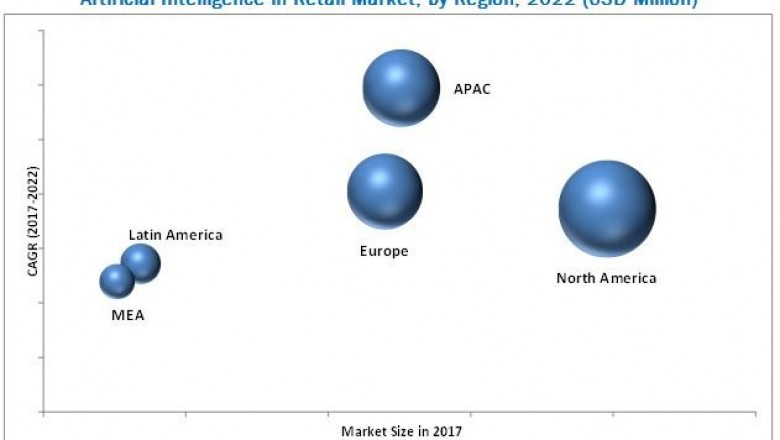views

Accordingto a new market research report "Artificial Intelligence in Retail Marketby Type (Online, Offline), Technology (Machine Learning and Deep Learning,NLP), Solution, Service (Professional, Managed), Deployment Mode (Cloud,On-Premises), Application, Region - Global Forecast to 2022", published byMarketsandMarkets™, The AI in retail market size is expected to grow from USD993.6 Million in 2017 to USD 5,034.0 Million by 2022, at a Compound AnnualGrowth Rate (CAGR) of 38.3%. The key factors driving the growth of the AI inretail market include the increasing need to streamline omnichannel retailingand customer turnover.
Browse61 Market Data Tables and 32 Figures spread through 138 Pages and in-depth TOCon "ArtificialIntelligence in Retail Market by Type (Online,Offline), Technology (Machine Learning and Deep Learning, NLP), Solution,Service (Professional, Managed), Deployment Mode (Cloud, On-Premises),Application, Region - Global Forecast to 2022"
Major Key Companies:
Themajor vendors providing AI in retail solutions and services include Microsoft(US), Google (US), IBM (US), NVIDIA (US), Intel (US), Oracle (US), Sentient Technologies(US), Salesforce (US), Amazon Web Services (US), SAP (Germany), InbentaTechnologies (US), Nuance Communications (US), SAMSUNG (South Korea), NarrativeScience (US), Daisy Intelligence (Canada), Infosys (India), Wipro (India),Happiest Minds (India), MicroStrategy (US), Dynamic Yield (US), IPsoft (US),Appier.com (Taiwan), ViSenze (Singapore), Manthan Software Services (India),and Optoro (US).
Thesignificant need to understand the customers well and improve the end-userexperience for shoppers has increased the adoption and acceptance of AI-basedsolutions and services among retail businesses. Retailers are implementingAI-based solutions to streamline their retail operations and increaseproductivity. AI is assisting them in generating more revenue, analyzing andidentifying future risks, and deriving strategic insights for improveddecision-making. These factors are driving the demand for AI technologies inthe retail industry.
Growingawareness about the benefits of AI-supporting business models and thecapabilities of machine learning, deep learning, and natural languageprocessing technologies are offering major opportunities for retail businesses.To differentiate themselves and offer the best customer experience, retailersare utilizing the capabilities of the AI technology. This is a major driver forthe increased adoption of AI in the retail industry.
Ask for PDF Brochure @ https://www.marketsandmarkets.com/pdfdownloadNew.asp?id=36255973
Compatibilityissues of AI solutions with the existing systems of businesses and theintegration of AI technologies with the current legacy systems are matters ofconcern. For the AI solutions to run successfully, effective integration of AItechnologies with customers’ IT infrastructures and systems is significant.This is restraining the growth for AI in retail market.
Amongthe technologies, the machine learning and deep learning segment is expected tobe the highest contributor to the AI in retail market, owing to the surgingdemand for value-added management and cost-effectiveness. Additionally, theincreasing need of organizations to improve productivity while maintainingcustomer relationships and the brand name is another vital factor influencingthe technology adoption. The collective capabilities of these technologiesassist retailers in recommending the next action for refining the retailstrategy.
AsiaPacific (APAC) is expected to grow at the highest CAGR during the forecastperiod. The AI in retail market is expected to grow significantly in thisregion, due to improved awareness and the emergence of sophisticatedtechnologies backed by AI. There is a strong future economic value forbusinesses, customers, governments, and investors in APAC. Additionally, highmarket growth is expected, due to technological advancements and mandatoryregulations imposed by government regulatory entities in the region forfacilitating the adoption of the best-in-class technologies and standards.
Companiesoffering AI in retail solutions are constantly involved in devising newstrategies to maintain a competitive market position. For instance, in May2017, Google announced a multitude of new elements for Google Assistant, andGoogle Home. The launch of Google assistant as an AI platform will further helpretailers to connect with customers and boost sales. Moreover, in October 2017,Capillary Technologies launched AI based, computer vision and machine learningpowered product named as “VisitorMetrix for retail stores. Additionaly, in Nov2016, Amazon Web services launched 3 AI services namely Amazon Lex, AmazonPloy, and Amazon Rekognition. . Due to the growing competition, companies areusing several AI-capable solutions to personalize product offerings.
Browse Complete Report @ https://www.marketsandmarkets.com/Market-Reports/artificial-intelligence-ai-retail-market-36255973.html












